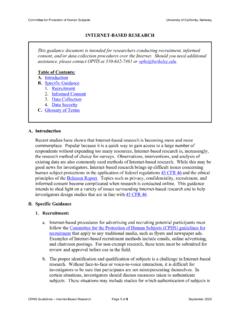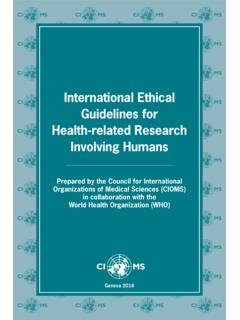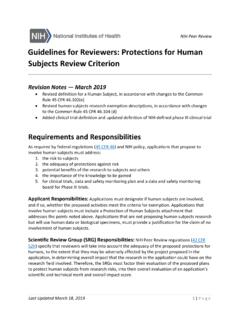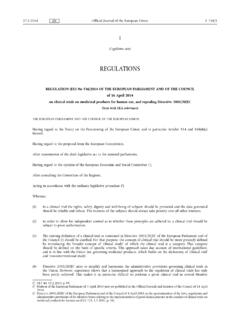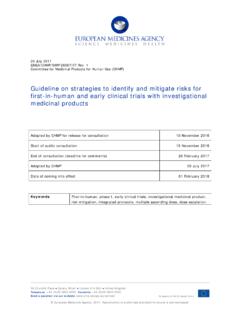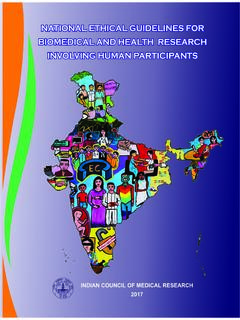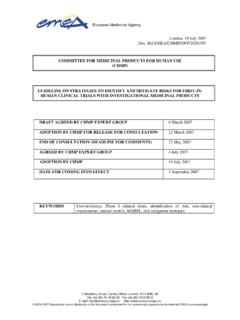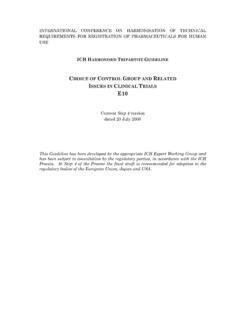Transcription of Compensation of Research Subjects
1 Committee for Protection of human Subjects University of California, Berkeley CPHS guidelines Compensation Page 1 of 6 July 2017 Compensation OF Research Subjects This guidance document is intended for investigators planning to provide Compensation (monetary or non-monetary) to Subjects for participation in Research . Should you need additional assistance, please contact OPHS at 510-642-7461 or Table of Contents A. Scope/Introduction B. Important Concepts C. Protocol and Consent Considerations D. Ethical Considerations 1. Amount of payment 2. Timing and form of payment 3. Compensation of minors and other vulnerable populations E. Lotteries, Raffles, and Drawings 1. General information 2. Guidance F. IRS Reporting and Collection of Social Security Numbers G.
2 UC B erkeley human subject Prepaid Card Program (HSPC) A. Scope/Introduction Federal regulations provide no clear guidance on the level of Compensation that should be offered to Research Subjects . However, the regulations do require that researchers seek consent only under circumstances that minimize the possibility of coercion or undue influence (45 CFR ). Research incentives may limit the ability of the Research subject to provide truly voluntary, informed consent. Subjects should be able to make informed decisions to participate based on the real risks and benefits of participation, not on Compensation . subject Compensation should be equitable, and the confidentiality of information related to payments should be protected. Thus, the IRB will review protocol plans for subject Compensation with these goals in mind, and researchers should be cognizant of the related issues, as discussed below.
3 B. Important Concepts Compensation : Payment or non-monetary reward is given to Subjects as remuneration for time and inconvenience of participation, as well as an incentive to participate. Compensation can include remuneration that is monetary (cash, gift cards, vouchers, etc.) and/or non-monetary (gifts/promotional items, course credit, extra credit, etc.). There are two ways in which Compensation can be problematic: Undue influence: An offer of excessive or inappropriate reward is made in order to Committee for Protection of human Subjects University of California, Berkeley CPHS guidelines Compensation Page 2 of 6 July 2017 obtain compliance. For example, a researcher might offer a month s salary to Subjects for one-day participation in a study to test the effects of an investigational drug with potentially serious side effects.
4 Because the level of Compensation could induce Subjects to participate against their better judgment, this offer might present undue influence. Coercion: A n overt or implicit threat of harm or negative consequences is intentionally presented by one person to another in order to obtain compliance. For example, an instructor might tell prospective Subjects in a class that they will lose grade points if they do not participate in the Research this would be coercive. Compensation for Research is not coercive in and of itself, since it does not involve a threat of harm. However, Compensation can create potentially coercive situations, as when a third party i s paid for another subject s participation, and that third party can exert coercion over the subject in order to obtain payment. For example, payment to a parent for a child s participation or incentives paid to a doctor or nurse for Research recruitment could create coercion.
5 C. Protocol and Consent Considerations The CPHS protocol application should fully describe the plan for Compensation of Subjects as well as the reasoning behind amount, method, and terms of Compensation . The informed consent document should disclose all information concerning payment, including the total amount, schedule/form of payment, and any plans for prorating payment if a subject withdraws. Compensation is not considered a benefit to subject participation and is not taken into account when the IRB weighs the risks and benefits of the Research . Therefore, this information should be stated separately from the discussion of benefits in both the protocol and consent document. It is also appropriate to disclose possible Compensation in recruitment/advertising materials. In general, payment information should not be any more prominent than other elements ( , purpose, procedures, inclusion criteria, etc.)
6 See CPHS guidelines on subject Recruitment for further information and examples. D. Ethical Considerations 1. Amount of payment: Compensation should be appropriate for the time and effort Subjects devote to participation. The level of payment should not be high enough to cause Subjects to accept risks that they would not otherwise accept or participate in activities to which they would otherwise strongly object based on personal values or beliefs. Excessive incentives may also be of concern since they could induce Subjects to lie or conceal information that would disqualify them from the study in order to receive payment. This could in turn undermine the scientific integrity of the study or compromise the safety of the subject . On the other hand, if Subjects are being asked to undergo a certain amount of risk or discomfort/inconvenience with no direct benefit, and no Compensation of any kind will be offered, the IRB may ask the investigators to justify this.
7 The same is true if it is proposed to compensate Subjects at a rate that is substantially lower than average local Compensation for such activity, or to compensate Subjects in one group less than another, even though Subjects in both groups will carry out the same procedures (see below). The Committee for Protection of human Subjects University of California, Berkeley CPHS guidelines Compensation Page 3 of 6 July 2017 IRB will consider individual circumstances, including funding or lack thereof, for such studies. Many researchers base the payment amount on the average wage in the location where the Research is conducted or for the specific study population. This is often an acceptable level of payment that does not exert undue influence. When hourly payments are not suitable or feasible, Compensation may be task- or procedure-specific (for example, some studies pay Subjects per sample collection or survey).
8 In general, all Subjects completing the same tasks in a single Research project should be compensated at equivalent rates. In some cases, distinct subject populations may be compensated at different rates, but clear justification for this is needed. For example, a Research study with several international sites may have different payment levels depending on the average local wage. Whenever possible, Subjects should be reimbursed for costs incurred as a result of study participation ( , parking and transportation costs, meals, etc.). These payments should be differentiated from Compensation in the study protocol and consent form(s). 2. Timing and form of payment: Consideration should also be given to timing of payment. Making payment conditional on completing a multi-session study could unduly influence a subject s decision to exercise his/her right to withdraw at any time.
9 For studies that require extended time or multiple interactions/interventions, it is recommended t hat payment be prorated for the time of participation in the study rather than delayed until study completion. However, it would be acceptable to compensate Subjects who withdraw early from a study at the time they would have completed it. While total Compensation should not be contingent on completion of the entire study, it is acceptable to offer an additional incentive or completion bonus to Subjects that remain for the duration of the study. For example, a researcher might offer a small bonus percentage of total Compensation if Subjects complete all sessions in a study. If offered, these amounts should be reasonable so as not to unduly influence Subjects to stay in the study when they otherwise would have withdrawn. Alternative forms of Compensation (such as gift cards, certificates, or other tangible gifts) are acceptable forms of payment and are considered by the IRB in the amount of their cash equivalent.
10 Other online Compensation schemes (such as through Mechanical Turk or a prepaid online code) may also be used, but researchers using these forms of payment should ensure that the method of payment can be readily used by participants ( , the store or outlet is easily accessible) and is appropriate to the population. Note: For clinical trials, FDA guidance prohibits payment in the form of coupons good for a discount on the purchase price of a test article (drug or device) once it has been approved for marketing. For studies involving students, class credit or extra credit may be offered as Compensation under certain conditions. For more information in this regard, check with UCB programs which operate student subject pools under protocols approved by CPHS, such as the Psychology Department s Research Participant Program (RPP), the Haas School of Business Experimental Social Science Laboratory (Xlab), and the Haas Committee for Protection of human Subjects University of California, Berkeley CPHS guidelines Compensation Page 4 of 6 July 2017 Management of Organizations Behavioral Lab.
